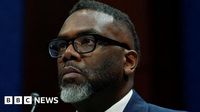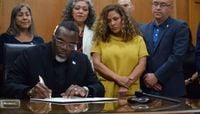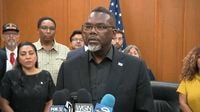Chicago is bracing for a potentially dramatic federal intervention as Mayor Brandon Johnson moves to confront President Donald Trump’s plans to deploy hundreds of immigration enforcement agents—and possibly National Guard troops—to the city. On August 30, 2025, Johnson signed the “Protecting Chicago” executive order, launching a multi-pronged initiative to resist what he describes as an imminent and unprecedented escalation of federal presence on Chicago’s streets.
The mayor’s move comes amid mounting reports that the Trump administration is preparing a major immigration enforcement operation, with sources indicating that more than 200 federal agents could arrive as early as September 2, 2025. The agents are expected to use Naval Station Great Lakes, just north of the city, as their command center—a fact confirmed by two sources familiar with base operations, according to the Chicago Sun-Times. While the base will serve as a headquarters, it will not house the agents themselves.
Mayor Johnson’s executive order, the “Protecting Chicago Initiative,” is the culmination of months of planning and coordination among city departments. “I do not take this executive action lightly,” Johnson told reporters on Saturday. “We have received credible reports that we have days, not weeks, before our city sees some kind of militarized activity by the federal government.”
Johnson’s order directs city agencies to regularly submit Freedom of Information Act (FOIA) requests regarding actions taken by the U.S. Department of Homeland Security, Immigration and Customs Enforcement (ICE), and Customs and Border Protection (CBP). The goal, Johnson says, is to keep the public informed and ensure transparency about federal deployments and operations. The Mayor’s Office for Immigrant and Refugee Rights will spearhead efforts to educate residents—regardless of immigration status—about their rights during potential federal encounters. This includes launching a Family Preparedness campaign in multiple languages, aimed at helping families prepare for possible detentions.
At the heart of the executive order is a demand that federal law enforcement and any U.S. armed forces personnel operating in Chicago adhere to the same policies that govern the Chicago Police Department (CPD). These include prohibiting officers from wearing masks or coverings intended to conceal their identities, requiring the use of active body cameras during all public interactions, and mandating the clear display of identifying information—such as agency name, last name, and badge number. The order also firmly reaffirms that CPD will remain a locally controlled agency and will not cooperate with federal or military units in city policing, crowd-control, or public-safety operations.
“This is about making a clear distinction between what our law enforcement engages in versus what federal agents engage in,” Johnson explained during the press conference. “We do not want to see tanks in our streets. You do not want to see families ripped apart. You do not want grandmothers thrown into the back of unmarked vans.”
Johnson’s stance has drawn sharp reactions across the political spectrum. Alderman Ray Lopez, representing the 15th Ward, has argued that the deployment of National Guard troops could actually improve public safety. “I believe that we already work with the federal government on multiple levels. This would be an enhancement to that, and there are safeguards in place, and there should be nothing stopping us from exploring those options,” Lopez said, adding that better communication between the mayor and the president could ease tensions.
Conversely, Alderman Mike Rodriguez of the 22nd Ward voiced deep concern: “How would you feel if you’re in Little Village trying to send your kid to school, go to church, open your shop with tanks potentially running down your streets? This is unacceptable, un-American and counterproductive to the public safety we want to bring to the city.”
Other city officials and community leaders have weighed in as well. The Chicago Teachers Union praised Johnson’s move, stating, “we know that safety does not come from federal forces invading our city.” Meanwhile, Lake County commissioner Esiah Campos called for a statewide ban on law enforcement use of masks and urged local mayors not to assist ICE, reflecting a broader push among some Illinois officials to distance themselves from federal immigration crackdowns.
On the legal front, Johnson has threatened to pursue court action against federal officers who do not comply with the city’s rules. Yet, constitutional law experts caution that the city’s ability to impose municipal law on federal agents is likely limited. Julian Davis Mortenson, a professor at the University of Michigan, explained to the Chicago Sun-Times that while Johnson’s order is “well thought out” in asserting local control, federal law enforcement typically operates under federal, not local, authority. “Assuming the law enforcement operation is valid and there’s not some limitation to the scope of the federal authority … I don’t think a state government’s suit seeking to impose municipal law on how law enforcement conducts their operations would do very well,” Mortenson said.
The White House has dismissed Johnson’s executive order as a “publicity stunt.” In a statement, spokesperson Abigail Jackson contrasted Chicago’s response with that of Washington D.C. Mayor Muriel Bowser, who has welcomed federal support and reported significant drops in violent crime following a federal law enforcement surge. “If these Democrats focused on fixing crime in their own cities instead of doing publicity stunts to criticize the president, their communities would be much safer,” Jackson wrote. The White House claims that since the Washington surge began on August 7, 2025, more than 1,200 people have been arrested and 135 firearms seized, with carjackings, robberies, and violent crimes reportedly plummeting by over 50% compared to the same period in 2024. However, legal experts and defense attorneys have raised concerns about the legality and effectiveness of some of these arrests, citing issues with evidence and alleged illegal searches.
President Trump has not shied away from making his position clear. On August 30, he posted on Truth Social, “Six people were killed, and 24 people were shot, in Chicago last weekend, and JB Pritzker, the weak and pathetic Governor of Illinois, just said that he doesn’t need help in preventing CRIME. He is CRAZY!!! He better straighten it out, FAST, or we’re coming! MAGA. President DJT.” Governor Pritzker quickly fired back on X, saying, “Why don’t you send everyone proof of life first? (Either way, Chicago doesn’t want you here).”
Despite the heated rhetoric, Chicago’s own crime data shows a mixed picture. The Chicago Police Department reported three people were fatally shot over the weekend of August 29-31, 2025—a figure far lower than the numbers cited by Trump, but still a cause for concern among residents and officials alike.
As the city waits for the federal operation’s next move, Johnson’s administration is doubling down on its efforts to inform, protect, and prepare Chicagoans. The mayor has made clear that he intends to use “every single tool at our disposal,” including the courts, legislative advocacy, and public education campaigns, to ensure that Chicago’s values and autonomy are upheld—even in the face of mounting federal pressure.
With the arrival of federal agents just days away, Chicago finds itself at the intersection of a national debate over immigration, policing, and the limits of federal power. The outcome of this standoff could set a precedent for cities across the country grappling with similar challenges in the months and years ahead.



